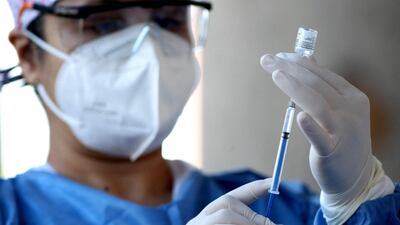Covid-19 infections are still falling in Israel 40 days after the lifting of lockdowns, said a scientist and health expert at Israel’s Weizmann Institute.
The optimistic assessment on the country’s strategy of mass inoculation comes after the institute analysed the latest Covid-19 case data.
Eran Segal, a scientist at the institute said on Twitter that Israel’s R-number was still falling amid a national mass vaccination campaign. Scientists define the R number as the average number of people to whom one infected person will pass a virus.
In addition to working at the Weizmann Institute, Dr Segal is also the principal investigator at Segal Lab, which lists big data in health care as an area of research.
Dr Segal’s assessment also highlighted that hospital cases were down 85 per cent – a critical data point for hospital wards that have been overwhelmed with Covid patients.
If the positive indications hold up in the coming days and weeks, it could be significant for the many countries now pursuing mass vaccination as a pillar of their anti-Covid-19 strategies.
There have been fears that new, rapidly spreading strains could complicate vaccination efforts.
Israel worked quickly to vaccinate its population and has already inoculated nearly 60 per cent of its nine million citizens with at least one shot of vaccine.
In February, a real-world test of Pfizer-BioNTech’s Covid-19 vaccine in Israel found it was 94 per cent effective at preventing severe diseases after two shots.
But there may be stumbling blocks ahead, including vaccine hesitancy among some segments of the population. Initially, Israel was able to vaccinate on average 1.5 per cent of its population per day, but this has now fallen to 0.2 per cent per day.
Potential problems reaching 70 per cent immunisation among the population, a figure experts say is crucial to completely control the virus, have led to growing public controversy over “vaccine hesitancy”.
The term is used to refer to the refusal to be vaccinated due to concerns over side effects, a lack of concern about the virus or a belief in conspiracy theories about vaccine programmes.
Last week, an Israeli labour tribunal ruled that a teacher who refused to be vaccinated would not be allowed to work, following a local council's decision to ban her from attending school. This could set the stage for a legal battle over individual rights, reported Israeli newspaper Haaretz.
The case is now expected to be taken to the Israeli Attorney General’s office, which cautioned last month that unvaccinated teachers could not be barred from school without new legislation.
On the national government level, the mass inoculation drive has also become highly politicised, arguably more so than in other countries which have followed a similar approach.
Alongside Israel, the UK, US and UAE are world-leading in having vaccinated a high percentage of the population.
On Tuesday, Israelis will vote in a general election with PM Benjamin Netanyahu having pinned much of his hopes on the success of vaccines, to the extent of giving his campaign the slogan “back to life”.
_______________












